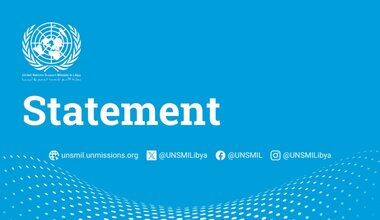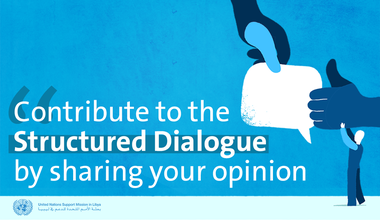UN Warns Against Sliding into Violence and Calls for Non-Disruption of Institutions
Tripoli 6 February 2014 - The United Nations Support Mission in Libya (UNSMIL) condemns the continued violence in Libya in all its forms, from assassinations to kidnappings and explosive attacks, including what happened in "Mahd al Marefa" school in Benghazi
UNSMIL expresses deep concern at the fact that such practices cause severe and deep damage that adversely affects the security and stability of Libya. It calls on the State and all concerned parties to shoulder their responsibilities in actively seeking to end violence and prevent the country from sliding into further lawlessness and chaos.
The Mission calls upon officials, revolutionaries, political leaders, other public figures and active Libyan society forces to spare no effort to prevent the use of violence as means for political pressure or resolving differences. In the present context, UNSMIL believes that political competition and conflicting views do not justify, in any way, the use of violence or the threat of it.
The Mission had called in the past two months five consultative meetings between the political forces to alleviate divisions and prevent risks that they could cause, examine the transitional period issues, and focus on commonalities and agree on appropriate legislative measures that ensure peaceful transition of power.
Although consensus on visions and positions was not achieved, differences over the roadmap for the remainder of the transitional period have been narrowed. Today, the political forces should not lose hope of achieving consensus, which could dissipate the growing concern of Libyans with the advent of dates that have become, in the view of some, milestones in the transitional path. Whatever the differences, safeguarding the legitimacy and avoiding disruption of institutions are a national responsibility that rests with everyone. This does not mean, in any way, the forfeiture of the right of any group of citizens to freely express their objections and demands, many of which require attention and even need to be addressed by the legal institutions.
UNSMIL cannot but recall that the participants in the consultative meetings between the political forces unanimously agreed on principles governing the management of the transitional period, particularly to prevent a vacuum in the legislative and executive branches; adherence to democratic principles and norms, including the reform of the elected institutions from within; accuracy in establishing timetables and strict adherence to them; and openness and transparency in addressing public opinion.
The difficult conditions characterizing today's public life in Libya are not a destiny and they cannot overpower the collective national will. Libyans, despite their different backgrounds, intellectual and political leanings, are able, if they have the will, to overcome these differences and move forward in completing the transitional period.
Therefore, UNSMIL urges all forces to convene in a comprehensive, inclusive, national dialogue that does not exclude anyone in order to unite Libyans around national priorities and solutions to the real problems they face. UNSMIL stands ready to provide advice and expertise in facilitating dialogue and accompanying the political process to prevent it from stalling, as well as creating the necessary conditions for the drafting of a new constitution acceptable to the Libyans.
 United Nations Peacekeeping
United Nations Peacekeeping UN
UN









